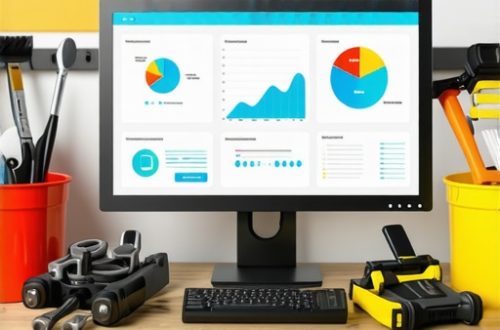
Signal Repair Strategies to Boost Local Rankings in 2024
My Journey with Signal Repair Strategies: From Frustration to Local SEO Success
I’ll never forget the day I realized my Google My Business (GMB) listing was suddenly invisible in local searches. It was a wake-up call that made me dive deep into signal repair strategies. As someone passionate about local SEO, I knew that fixing these signals could dramatically boost my rankings, and I was determined to learn everything I could about it.
Understanding the Power of Signal Repair in Local SEO
In my experience, signal repair is like tuning a musical instrument — when done right, your local listings resonate perfectly with search algorithms. These signals include consistency in NAP citations, accurate categories, and optimized Google reviews. I found that paying close attention to these details helped me climb the local search results faster than I ever imagined.
Practical Steps to Repair and Enhance Your Signals
One thing I learned early on is the importance of regular GMB cleanup. Removing duplicate listings and fixing incorrect data can make a huge difference. I often refer to authoritative sources like Moz for comprehensive local SEO tips, which reinforced my understanding of signal integrity (Moz’s guide on citations).
Next, I focused on building strong, consistent citations across relevant platforms. This included updating my business information and ensuring consistency across all directories. This process was tedious but essential, and I saw immediate improvements in my local rankings.
Why Signal Repair Matters More Than Ever in 2024
As local SEO evolves, signal repair becomes even more crucial. With Google continuously updating its algorithm, maintaining clean, accurate signals ensures your business stays competitive. I’ve noticed that businesses neglecting this aspect often see their rankings drop unexpectedly. That’s why I always recommend regular audits and updates.
What are the most common signal issues I should watch out for?
From my experience, duplicate listings, inconsistent NAP data, and negative reviews are top culprits. Addressing these promptly can prevent ranking drops and improve your visibility. Also, don’t overlook the importance of Google reviews — they’re powerful signals that can boost your local SEO significantly.
If you’re eager to learn more about optimizing your local search presence, I suggest exploring GMB cleanup tips for practical advice on maintaining healthy signals.
Finally, I’d love to hear your experiences with signal repair. Drop a comment below or share your successes — I believe peer insights can inspire us all to master local SEO in 2024!
Beyond Basics: How to Detect and Correct Hidden Signal Weaknesses
While most local businesses focus on obvious issues like duplicate listings or inconsistent NAP data, savvy SEO professionals know that subtle signal discrepancies can silently undermine their rankings. For instance, inconsistent keyword usage in your business descriptions or variations in your business categories across platforms can create conflicting signals that search algorithms struggle to interpret. Regularly auditing your signals with tools like signal repair strategies helps uncover these hidden issues before they impact your local visibility.
How Does Google Interpret Mixed Signals in Local SEO?
Google’s algorithm attempts to synthesize multiple signals to determine the relevance and trustworthiness of a business. When signals are inconsistent—say, mismatched business hours across directories or conflicting reviews—the algorithm may become confused, leading to lower rankings or reduced visibility. Understanding this, I emphasize the importance of creating a unified, authoritative presence across all platforms. This is why regular signal audits are crucial for maintaining a clear and compelling local search profile.
Can You Use Customer Reviews as a Signal Repair Tool?
Absolutely. Reviews are not just social proof—they’re potent signals that influence local rankings. Encouraging satisfied customers to leave detailed, keyword-rich reviews can significantly enhance your signal profile. However, it’s essential to respond to reviews authentically and resolve negative feedback promptly, as this demonstrates active engagement and trustworthiness. Integrating review management into your signal repair routine ensures that reviews contribute positively to your local SEO efforts.
The Practical Impact of Ongoing Signal Optimization
Consistent signal repair doesn’t just preserve your rankings—it can propel your business ahead of competitors who neglect this aspect. For example, updating your Google My Business categories to better reflect your services can open new search queries. Similarly, refining your local citations to include recent, accurate data can enhance your prominence in local packs. These ongoing efforts require a strategic approach, combining technical audits with a focus on customer engagement.
What are the overlooked signals that can make or break your local SEO success?
From my experience, some often-neglected signals include your website’s local content relevance, your business’s social media activity, and your consistency in using local keywords across all platforms. Additionally, your business’s proximity and overall reputation play a crucial role. Addressing these nuanced signals requires a comprehensive, data-driven approach, supported by regular audits and strategic updates. For more detailed guidance on maintaining a healthy signal profile, I recommend exploring GMB cleanup tips.
If you found these insights helpful, I invite you to share your experience with signal repair or ask questions in the comments. Your stories and challenges can inspire others to refine their local SEO strategies and achieve greater visibility in 2024!
How Do Subtle Signal Discrepancies Undermine Your Local SEO Without You Realizing?
Over the years, I’ve discovered that the most insidious issues in local SEO often lie beneath the surface—small inconsistencies in your business details, nuanced variations in your categories, or mismatched keywords across platforms. These discrepancies may seem minor, but search engines like Google are highly sensitive to conflicting signals. I remember spending hours auditing my listings, only to find that a slight variation in my business description or a forgotten social media mention was quietly weakening my local rankings. This experience taught me that meticulous attention to detail is crucial, and regular comprehensive audits are your best defense.
Can Google Truly Interpret Mixed Signals Without Confusing Your Business Identity?
When I first encountered ranking fluctuations, I wondered whether Google could differentiate between genuine signals and conflicting data. The answer, as I’ve learned through deep diving into authoritative sources like Moz’s local SEO guide, is yes—but only if your signals are consistent and well-structured. Google’s algorithm synthesizes multiple data points to establish relevance and trustworthiness, but conflicting signals create confusion, ultimately leading to lower rankings or reduced visibility. This is why I emphasize the importance of maintaining a unified, authoritative presence across all platforms and regularly auditing your signals to prevent subtle inconsistencies from creeping in.
How Do Customer Reviews Act as a Double-Edged Sword in Signal Repair?
Reviews are powerful yet complex signals—they can propel your local SEO when positive and keyword-rich, but negative reviews or inconsistent responses can undermine your efforts. I’ve found that encouraging satisfied customers to leave detailed reviews helps reinforce your signals, especially when responses are personalized and timely. Addressing negative feedback transparently not only improves your reputation but also signals active engagement to search engines. Incorporating review management into your routine, using strategies outlined in GMB cleanup tips, ensures your review signals remain strong and trustworthy.
What’s the Most Overlooked Signal That Can Sabotage Your Local SEO?
In my experience, local content relevance often gets overlooked. Creating localized content that resonates with your community and incorporates relevant local keywords is vital. It not only attracts more local traffic but also signals to Google that your business is deeply rooted in the community. Additionally, social media activity, when aligned with your local SEO strategy, can amplify your signals. Regularly updating your profiles, engaging with local followers, and sharing community-focused content can significantly boost your visibility. For more insights, explore comprehensive local SEO strategies.
Finally, I invite you to reflect on your own signal repair journey. Have you uncovered hidden discrepancies or overlooked signals that could be holding you back? Sharing your experience or questions in the comments not only helps you but also enriches our collective understanding of local SEO mastery in 2024. Remember, ongoing signal optimization is a continuous process—stay vigilant, stay proactive, and watch your local rankings soar!
Deciphering the Nuances of Signal Discrepancies in Competitive Local Markets
Over the years, I’ve come to understand that subtle inconsistencies often act as silent saboteurs in local SEO. For instance, variations in business category selections across platforms or slight discrepancies in service descriptions can create conflicting signals that confuse search engines. These issues become particularly pronounced in saturated markets where every detail counts. Regularly auditing your signals with sophisticated tools like signal repair strategies allows you to identify and rectify these hidden discrepancies before they impact your rankings significantly.
Can Google Truly Distinguish and Prioritize Your Core Signals Amid Conflicting Data?
Google’s ability to interpret signals hinges on the consistency and authority of your data. When faced with conflicting information—such as mismatched operating hours or inconsistent NAP details—Google may struggle to determine your business’s true identity, leading to lower rankings or reduced visibility. To mitigate this, I advocate for creating a unified, authoritative digital footprint. This involves meticulous synchronization of your data across all platforms and regular audits to prevent subtle inconsistencies. According to Moz’s comprehensive local SEO guidelines, maintaining data integrity is paramount to establishing trustworthiness in search algorithms (Moz’s local SEO guide).
How Do Customer Reviews Function as a Double-Edged Sword in Signal Fortification?
Reviews are undeniably powerful signals—they can propel your local SEO efforts when positive, keyword-rich reviews are amassed consistently. However, negative reviews or poorly managed responses can inadvertently weaken your signals. I’ve learned that encouraging satisfied customers to leave detailed reviews, coupled with prompt, genuine responses, reinforces your reputation and signals active engagement to Google. Incorporating review management into your routine, as suggested in GMB cleanup tips, ensures reviews bolster your local ranking efforts rather than undermine them.
What Are the Most Overlooked Signals That Can Undermine Your Local SEO in 2024?
Beyond the obvious, factors such as your website’s local content relevance, your social media activity, and the consistency of local keyword usage across all channels play a critical role. For example, regularly updating your blog with community-focused content not only attracts local traffic but also signals your active presence in the community. Additionally, strategic social media engagement can amplify your signals, especially when aligned with your overall local SEO strategy. For deeper insights into maintaining a healthy signal profile, I recommend exploring comprehensive local SEO strategies.
In my experience, the continuous refinement of these nuanced signals is what separates thriving local businesses from those fading into obscurity. I encourage you to audit your current signals and identify overlooked opportunities that could significantly elevate your visibility in 2024. Share your insights or challenges in the comments—collaborative learning accelerates mastery in this complex landscape.
Things I Wish I Knew Earlier (or You Might Find Surprising)
The Hidden Power of Consistency
One thing I often overlooked at the start was just how crucial consistent NAP data and categories are across all platforms. I used to think minor discrepancies didn’t matter, but I learned the hard way that search engines pick up these subtle inconsistencies, which can quietly sabotage your local rankings. Regular audits and updates became my secret weapon.
The Surprising Role of Customer Engagement
Engaging with reviews, especially negative ones, might seem like just good manners, but I discovered that prompt, thoughtful responses significantly boost your signals. It shows active management and builds trust, which search engines interpret as authority. This insight transformed how I view review responses as part of signal repair.
Local Content is More Than Just Keywords
I used to think stuffing keywords in local content was enough, but I realized that genuine, community-focused content resonated better with both customers and Google. Sharing local stories or events helped me build a stronger local presence and signals that I truly care about the community I serve.
The Overlooked Impact of Social Media Activity
Many overlook social media’s influence on local SEO, but I found that active engagement and local mentions on social platforms can reinforce your signals. Sharing community involvement or local news creates a more comprehensive and trustworthy online presence.
Small Details Make a Big Difference
From my experience, tiny details like business hours, service descriptions, or even the tone of your listings can create conflicting signals. Meticulous attention to these nuances through regular audits ensures your signals stay aligned and robust.
Resources I’ve Come to Trust Over Time
- Moz’s Local SEO Guide: This comprehensive resource helped me understand the importance of citations and data consistency. It’s a must-read if you want to master local signals.
- Google’s My Business Help Center: Official and reliable, it’s invaluable for understanding platform-specific requirements and updates directly from Google.
- BrightLocal Blog: Their insights on local SEO trends and audit tips have kept me ahead of algorithm changes. I recommend it for staying informed.
- Search Engine Journal: Offers in-depth articles on local search strategies backed by industry experts, perfect for continuous learning.
Parting Thoughts from My Perspective
In my journey through local SEO and signal repair, I’ve realized that patience, attention to detail, and regular audits are your best allies. The landscape is constantly evolving, but the core principles of consistency and engagement remain steadfast. If you’re serious about improving your local visibility, invest time in understanding your signals and maintaining their integrity — it will pay off. Remember, these small, continuous improvements can lead to significant gains in your rankings and overall reputation. If this resonated with you, I’d love to hear your thoughts or experiences. Feel free to share in the comments or pass this along to someone who might find it helpful. Here’s to your success in mastering local SEO!




![Rescue Your Local Listing: 3 Broken Signal Fixes [2026]](https://gmbexorcist.com/wp-content/uploads/2026/02/Rescue-Your-Local-Listing-3-Broken-Signal-Fixes-2026-500x330.jpeg)